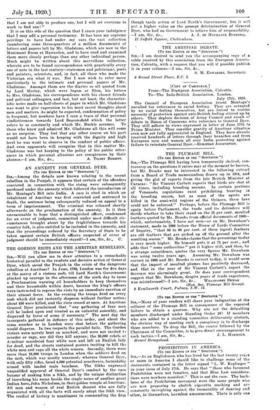THE GORDON RIOTS AND THE AMRITSAR REBELLION. [To THE EDITOR
OF THE "SPECTATOR."] you allow me to draw attention to a remarkable historical parallel to the resolute and decisive action of General Dyer, which saved the Punjab in the crisis of the dangerous rebellion at Amritsar? In June, 1780, London was for live days at the mercy of a riotous mob, till Lord North's Government plucked up courage in the afternoon of the sixth day to issue a Proclamation warning all householders to keep themselves and their households within doors, because the king's officers were instructed to repress the riots by an immediate exertion of their utmost force. In the evening the troops fired on every mob which did not instantly disperse without further notice; about 450 were killed, and the riots ceased at once. At Amritsar General Dyer proclaimed that "any gathering of four men will be looked upon and treated as an unlawful assembly, and dispersed by force of arms if necessary." The next day the insurgents gathered in defiance of this order, and about the same number as in London were shot before the gathering would disperse. In two respects the parallel fails. The Gordon rioters were merely bent on mischief, and were not incited t-) murder or rape, nor did they kill anyone; the 30,000 rebels at Armitsar murdered four white men and left an English lady for dead, and the streets contained posters inciting to kill the white men and rape all the white women. Secondly, there were more than 10,000 troops in London when the soldiers fired on the mob, which was mostly unarmed; whereas General Dyer, with, only fifty rifles, faced 4,000 potential murderers, formidably armed with loaded male bamboos. The Sikhs expressed unqualified approval of General Dyer's conduct by the rare honour of making him a Sikh, and by the unique distinction of inscribing his name beside the single name of another great Indian hero,John Nicholson,in their golden temple at Amritsar. 'All men and women of real British descent who are fully acquainted with all the facts will surely adopt the Sikh view. The verdict of history is unanimous in commending the firm
though tardy action of Lord North's Government, but it will put a higher value on the prompt determination of General Dyer, who had no Government to relieve him of responsibiliti.


































 Previous page
Previous page